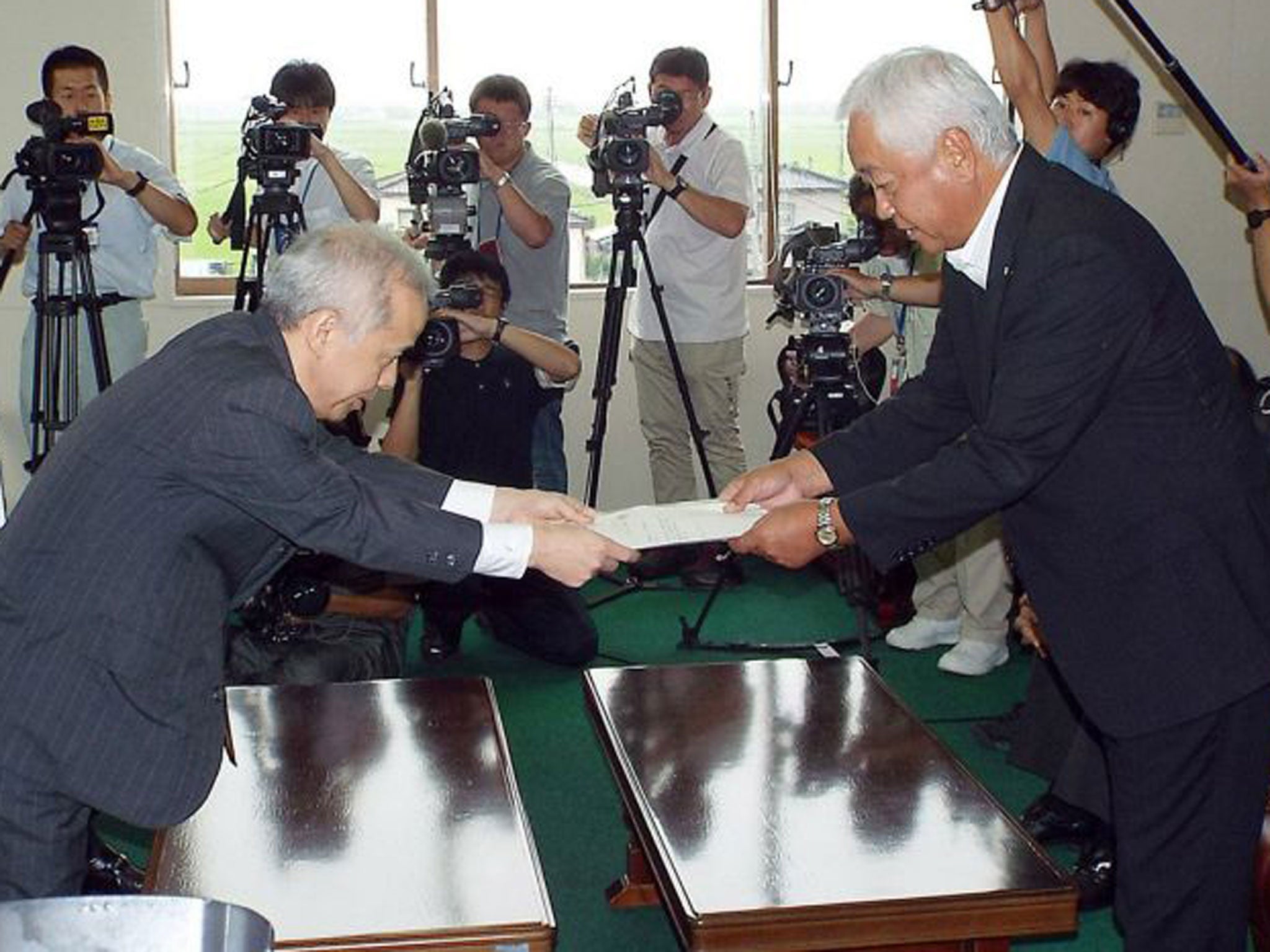Japan's nuclear boss apologises for 'sloppy decisions'
Local mayors furious at application to restart reactors two years after Fukushima disaster

Your support helps us to tell the story
From reproductive rights to climate change to Big Tech, The Independent is on the ground when the story is developing. Whether it's investigating the financials of Elon Musk's pro-Trump PAC or producing our latest documentary, 'The A Word', which shines a light on the American women fighting for reproductive rights, we know how important it is to parse out the facts from the messaging.
At such a critical moment in US history, we need reporters on the ground. Your donation allows us to keep sending journalists to speak to both sides of the story.
The Independent is trusted by Americans across the entire political spectrum. And unlike many other quality news outlets, we choose not to lock Americans out of our reporting and analysis with paywalls. We believe quality journalism should be available to everyone, paid for by those who can afford it.
Your support makes all the difference.The public act of contrition is a ritual in Japan as old as kabuki. Naomi Hirose, president of the embattled utility Tokyo Electric Power Company (Tepco), knows the components better than most: grimace as if in pain, bow to the waist and mouth a heartfelt mea culpa. The trouble is that he left it too late.
By the time Mr Hirose turned up in the town of Kashiwazaki yesterday to ask for permission to start the world’s biggest nuclear power plant, local leaders were furious. Tepco had earlier applied to Japan’s nuclear watchdog for a safety assessment to restart two reactors without consulting the town first.
As cameras clicked and whirred, Kashiwazaki’s mayor, Hiroshi Aida, gave the Tepco boss a humiliating dressing down. “We are very disappointed that you announced you will ask the Nuclear Regulation Agency for permission… without any explanation to us,” he said, adding that Mr Hirose’s actions threatened to “ruin” hard-won mutual trust.
Over two years since the triple meltdown at the Fukushima Daiichi complex, Tepco is struggling to convince host towns that it can be trusted to run nuclear power plants. Just two of Japan’s 50 reactors are online as local communities engage in fierce debates over their safety. Some plants sit on newly discovered seismic faults.
Tepco is desperate to restart the Kashiwazaki-Kariwa complex, which sprawls over two coastal towns in Niigata Prefecture. The 8.2 million-kilowatt monster generates enough power to supply over 10 million households and is the only Tepco-owned nuclear plant not directly affected by the earthquake and tsunami on 11 March 2011. The utility, which has run huge losses for two straight years, says it is losing about $10m a month for each of the plant’s seven reactors that is shut down.
The nuclear authority will start accepting applications for safety assessments on Monday. Legally the utilities can restart reactors without local permission once given the green light from the authority, but most observers believe that ignoring angry local hosts will be politically impossible.
Mr Hirose was forced to pay a call to the mayors of both towns yesterday to offer a typically convoluted explanation. “We sincerely apologise for your having had cause to criticise us for making hasty and sloppy decisions without giving considerations to local opinions,” he said.
Prefectural governor Hirohiko Izumida seemed unimpressed. “There is no greater disregard of local people than this,” he sniffed.
Six years ago, a strong earthquake almost directly underneath the Kashiwazaki-Kariwa complex burst pipes, triggered a fire and resulted in the release of radioactive steam and water. Nuclear officials were forced to admit that they had no idea the plant had been built on an active seismic fault.
Briton tips the balance of power
A British-American nuclear power expert hired to oversee the safety campaign at Tepco says the firm’s safety procedures are now good enough to warrant the restarting of nuclear reactors.
Lady Judge who also chairs the UK’s Pension Protection Fund, was drafted in to manage the utility’s safety reforms when three reactors melted down at the stricken Fukushima Daiichi power plant following the 2011 earthquake and tsunami. Almost all of Japan’s nuclear reactors were shut down after the accident.
Speaking in Tokyo today, Lady Judge, the honorary chairman of the UK Atomic Energy Authority, said Tepco had previously maintained a “culture of efficiency” rather than a “culture of safety”, but she believes that will change, and insisted nuclear energy was still the best option for Japan.
Join our commenting forum
Join thought-provoking conversations, follow other Independent readers and see their replies
Comments